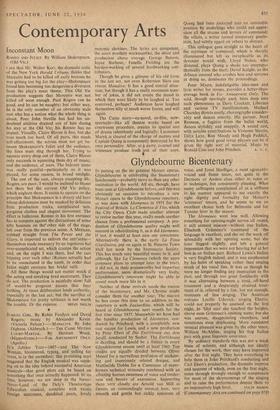Contemporary Arts
Inconstant Moon
ROMEO AND JULIET. By William Shakespeare. (Old Vic.)
i SEE that Mr. Walter Kerr, the dramatic critic of the New York Herald Tribune, thinks that Mercutio had to be killed off early because he was getting too big for the play—Shakespeare found him becoming too dangerous a diversion from the play's main theme. This Old Vic production suggests that Mercutio was not killed off soon enough. Paul Rogers can be good, and he can be naughty; but either way; he is the only member of an obviously stale cast who has a notion what the whole thing is about. Poor John Neville has had his un- doubted abilities drained out of him during his stay at the Old Vic; his Romeo has no impact. Visually, Claire Bloom is fine, but she tries much too hard. Of all parts, this needs self-effacement; the actress must not get be- tween Shakespeare's Juliet and the audience; the lines must sing through her. Trying to squeeze every drop out of them, Claire Bloom only succeeds in squeezing them dry of music; and the audience, of tears. The balcony scene was really painful—particularly as it was played, for some reason, in broad sunlight.
The rest of the cast, always excepting Mr. Rogers, are poor. I would be inclined to blame not them but the current Old Vic policy, which neglects them. It seems to operate on the principle that Shakespeare is a dreary old bore whose deficiencies must be masked by delicious little production tricks, complicated sets, gorgeous clothes and elegant movement. The effect is ludicrous. Romeo in his first entrance has to compete against the distractions of some silly business on the' other side of the stage, left over from the previous scene. A Mexican, cribbed straight from The Power and the Glory, is imported to enliven the entr'actes— themselves made necessary by an ingenious but over-complicated set, which cramps the action and, on the night I was there, had the cast tripping over each other (Romeo actually had to be resuscitated in the tomb, in order that Juliet might extricate her bridal veil).
All these things would not matter much if the acting and speaking bred excitement. They do not. The production is painfully slow; full of would-be pregnant pauses that hear nothing. At times deliberation lends authority, especially in the last act; but the sacrifice of Shakespeare for pretty tableaux is not worth the trouble. Or the expense. BRIAN INGLIS dr


































 Previous page
Previous page